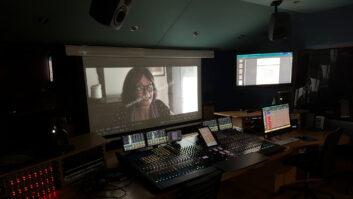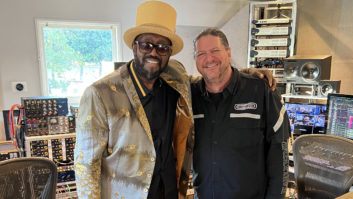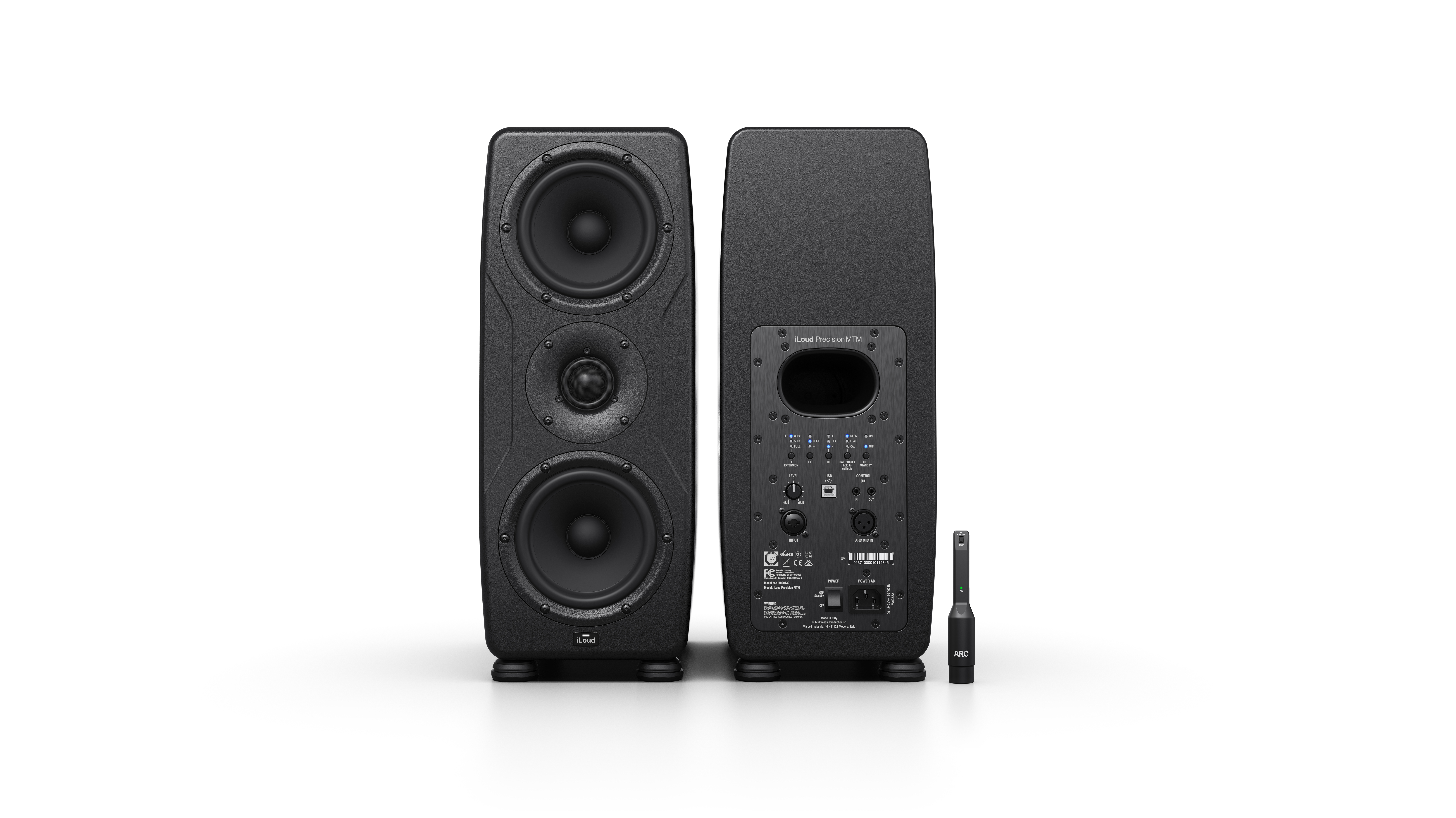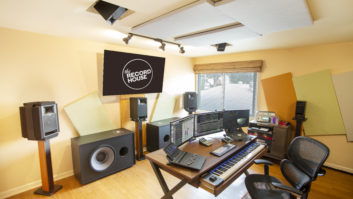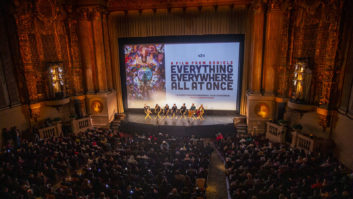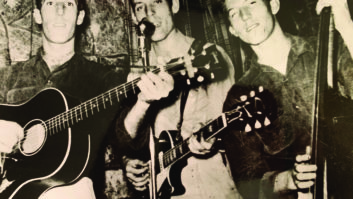
Brandon Mason
It’s 12:15 p.m. on March 27, 2009. Remember this so you won’t blame Mix magazine if everything in this feature is old news by the time our May issue is printed (around April 30). The music business — all business — seems to be changing that fast. Within months, we all saw “social networking” transform from trendy buzz words to an essential promotional tool, along with viral marketing, “freemiums” and “tweeting.” In some ways, the entire music-business model has turned upside down. How many times have you read in Mix‘s live sound section that an artist or band is “touring in support of a new release”? Yet that’s not necessarily what’s happening. More likely, an artist is giving away new songs online, or at least streaming them, to drive paying customers to their shows — the one source of revenue and in-the-moment musical joy that no one can really experience online, even if the concert is streamed live worldwide. You don’t see Michael Jackson rolling in the money from a farewell double-album — yet.

Carmen Rizzo
For newer acts especially, the process of artists accumulating a fan base and promoting music to the point where the parties involved can quit their day jobs has changed completely. So it follows that for music producers — those musician/therapist/parent/business manager/advocate types who have often played for points — it’s a new world. We talked to a handful of ultratalented producers in our industry who have addressed the morphing model by stepping up their involvement in their clients’ careers, doing every job from artist development to putting together business plans to producing on spec. Not surprisingly, most of these guys were already wearing a lot of hats when file sharing started rocking the boat.
The Producers
Carmen Rizzo is a two-time Grammy nominee whose talents as an electronic musician, mixer, remixer, composer and/or producer have contributed to recordings by Seal, Coldplay, Alanis Morissette, Paul Oakenfold and many more. He also co-founded the world-beat/electronic-fusion group Niyaz and co-produced the debut release from the collaboration Lal Meri (Six Degrees).
Producer/engineer/mixer Brandon Mason began his career at Bearsville Studios, and along the way has worked on recordings by Norah Jones, Tim McGraw and Ricky Martin. Other clients include New Order, David Bowie, the Secret Machines, The Zutons and his latest focus, rock ‘n’ rollers Loomis & the Lust.

James McKinney
An R&B/urban-music producer/keyboardist/composer/arranger/vocalist, James McKinney has performed with luminaries such as Stevie Wonder, Rachell Ferrell and Kenny Lattimore, as well as discoveries like Eric Roberson and Annaya Gregory. He runs independent label New Moon Recordings, and co-produced/co-wrote the 2009 Grammy-nominated performance of “Loving You” (Music) by Wayna and Kokayi.

Paul Worley
Nashville-based producer/guitarist/label exec Paul Worley is a two-time Grammy winner for his work with the Dixie Chicks. His many other production credits include Big & Rich, whom he signed as a new act to Warner Bros. in ’02 when he was VP of A&R there, and smash Capitol artists Lady Antebellum.
The Front End
Anybody can make a record now, but the business of getting music out there and making sure listeners take notice and maybe pay for it is changed. How has this affected the way you approach new work?
Rizzo: It’s important for someone like me to choose records carefully that I can truly get [more] work from. You want people to say, “You worked on that record? I love that record,” and want to hire you. I can remember many years ago I mixed a Britney Spears song for a producer, and I thought, ‘Shit, will I be getting calls for this kind of work?’ Thank god the song was not on the album…
For so long, you got a call from a record company, you showed up, worked and they paid you in 60 days. It was almost like you’re a plumber; that doesn’t happen anymore. I made the conscious choice a long time ago to carve out my reputation and take chances on music I like rather than just work for hire. It has paid off. You have to go out and find the work. You want repeat customers.
Mason: For the most part the model of label A&R developing talent isn’t really in place anymore, so the producer has to do the A&R part. You try to find an artist that’s really comfortable onstage with a sound that’s well-established in their own minds — then you can get down to the heart of crafting and presenting the artist’s vision in the studio. This begins to take shape during pre-production. It’s important to make sure you’re not searching for each song’s basic concept when you get into the studio because you need to turn records around pretty quickly today.
Last summer, I came across a fantastic rock ‘n’ roll band from Santa Barbara [Calif.] called Loomis & the Lust. They found me through my manager, Joe D’Ambrosio. They wanted help to take their music to the next level. They sent me demos, and I shared advice about how they could develop their sound: try a different tempo here, rewrite the bridge to this song. Once we got to where it seemed like we had an album together, I went to Santa Barbara and stayed with them for a few weeks, to continue working on the songs. That all happened before we went into a recording studio.
McKinney: I’ll always take a chance on artists I believe in. If I think the artist has a future, I will A&R the whole record, even as far as developing a business plan for the record, developing the artist, production, all the way through art direction for their release. A producer has to do everything in their power to make sure the release represents their best work.
Worley: Our business, as a business of only providing producing, engineering or owning a studio — any of those creative services — is dying. Now we have to be much more entrepreneurial in our thinking about whom we choose to work with. Look at them as an act, and say, “Is this the kind of act that is going to succeed and have a career, regardless of whether or not they are signed by a major label?” I’m doing a lot more work at discounted rates upfront, and even for free upfront, to be involved with people I think have a future.
The Value of Free
We’re all trying to make use of promotion methods such as viral marketing — giving music away to create buzz and reaping the rewards of a larger fan base. Radiohead gave an album away, which generated so much interest that they made a great profit. Nine Inch Nails did a similar thing last year. What is the strategic value of “freemiums”?
Rizzo: I think it’s important to give some music away, but I don’t subscribe to the Radiohead idea of giving away a record for free. I believe in giving the fan something like a free download of a song. I personally — and I’ve been saying this for years — think the future is a subscription-based fan. Meaning, let’s say you’re Radiohead and you’ve sold countless records, and you have 1 million loyal fans, and imagine you don’t need a record company. You just have a small office where you mail out your product and your fan pays, let’s say, $30 per year. And for that fee, they get a physical CD, a digital download of the album, a T-shirt, a discounted ticket when they come through your town, and a newsletter.
Mason: I think that as long as the music is self-released, we’re using it as a marketing tool to get people to shows. Of course, we’re selling CDs and merch at shows and online, but generally the music should be available for free to listen to, streaming on their MySpace page. [With Loomis & the Lust], we’re using recorded material to promote the live shows. We would like to get the record to a label so that songs can be sold to a wider market, but “free” right now is a promotional tool and a marketing tool to generate interest and create fans, and to generate excitement that we can take to the record companies.
McKinney: I’m more in favor of streaming or sampling than giving away a record. I love the viral marketing effect that [social networking sites] have because you can make the music available without giving it away. Also, the whole fear of file sharing never really bothered me much. When I was growing up, we had tapes and we made tapes for friends and it wasn’t a big deal. I don’t think it’s different now. It has an impact that people burn CDs, but to have music available for people to listen to and become fans is very important because what I want for my artists is real fans who will buy a whole album.
Worley: Early on, I believe in giving 100 percent to start any business. If you’re a young act, give your music away early on: Give it away online, give it to your fans. The data is showing that if you become popular, people will come back and pay for the music that you gave them and more if they feel that you have something to offer.
Here’s an example: There was an artist — this is about two years ago — and he wasn’t a straight-down-the-middle kind of artist, so the label was wrestling in their minds over how to promote him. His manager said, “Let’s just go out on the road and stir something up.”
So he went back to Athens [Ga.], where he’s from, and the manager started stirring up interest and was able to go back to the label and say, “You need to come down and see this.” So the label guys rode down to Georgia, went to see him at a club, and it was a dream come true: They saw cars and pickups and hundreds of kids milling around the parking lot, and they go in and it’s packed. It was an incredible show.
So they went up to the manager afterward, and said, “How did you do this?” And the manager hemmed and hawed, and said, “Well, we kind of spread some music around and got people familiar with the music.” And the label executives said, “What music?”
They had been giving away the label’s music in that marketplace to get people excited to come to shows. At first the label executive was irritated. He said, “You’re giving away my music? You have no right to do that!”
But it got everybody excited, and he’s been a very successful act, with very successful records, and the largest sales market, percentage-wise, was that market where the music was given away.
Facebook Fans
Social networking sites were trendy when they were introduced; now, they’re just part of the fabric of social interaction and music promotion. What’s the best way to use these tools?
Rizzo: I have thousands of “friends” on My-Space. How many of them are really fans? I’m not sure. But you have no choice in servicing all social networks, as well as your Website. This is the only way you can market yourself for free. But you should also not fly the flag too high of your play counts or how big your fan list is, because you have to take it with a grain of salt.
But everyone uses this now. Even the majors and the heavy indies, with the few in-house staff they have, that’s what they’re doing: viral marketing on the Web. I tell new artists it’s not easy, but you can do the same thing yourself.
Mason: People don’t turn on the radio to hear new music anymore; it’s passed from person to person. That’s the new radio. Somebody sends you a song with the e-mail heading, “Check this out.” Or people spend hours clicking from one link to another, finding some new music to fall in love with. So social networking is an important way to generate interest.
McKinney: Not only do fans get to stream the music and listen to it as many times as they like, they can also see what the artist is doing — find out where they’re playing, get more information, read their blog — and these are fan-building things, which are very valuable.
Worley: I think that as a new artist, you get involved in [social networking], and you do it actively, and you get good at it, and you talk to people who want to reach you on the Internet. You make yourself available. That’s where you collect your fan base and your data. If people engage with you, try to give them something, whether you’re just talking to them or giving them music. But get them involved in your culture, and if you can, get their phone number or their e-mail address. Then you’ve got something of value.
Live Rules
With artists giving more and more recorded music away and counting on revenue from a live performance, where’s the money for producers today?
Rizzo: One point that needs to be made is that producer points are almost useless these days, in my opinion. Getting paid on the back end is often hard to collect. If you’re the producer of, say, a Beyoncé record, then this doesn’t really apply, but for 90 percent of producers out there, it’s essential to get paid up front rather than get paid on the back end and hope it makes money.
Mason: When I decided to get into this industry, I wasn’t interested in only being locked up in a studio with clients to make records. I wanted to be involved in developing artists from the ground up, and then continue to provide guidance and support for the project after production is finished. It’s very rewarding on a creative level, and it means I have a financial stake in more aspects of their career.
McKinney: As a producer and a label owner, I have to make sure that the investment always fits the business and the budget of the record. I always look at going beyond just being the producer to being an investor and a middleman.
I have groups like Fertile Ground out of Baltimore, an independent group that has put out maybe six CDs in the past 10 years and has sold well over 100,000 CDs, a lot of them at live shows. Same thing with Eric Roberson. He’s constantly on the road and keeps putting out a new record every year, and sells hundreds of thousands of records as an independent artist. So the record and live shows are not separate for me as an investor; they go hand in hand.
Worley: I’m not just a producer; artist development is what I do. I always intend to be involved in my artist’s culture, not just their studio career. If I’m going to take on a client, I’m taking them from the ground floor up and giving them the benefit not just of my recording ability and my collective years of wisdom; I also want to be involved as a manager and as a publisher. I might not be into all these things for every artist I work with, but at least some of these things, so if I develop their career I have an opportunity to participate in the income and the career the artist is making.
Have any of your projects benefited from the model of giving music away as a “freemium”? Send your stories to[email protected].
